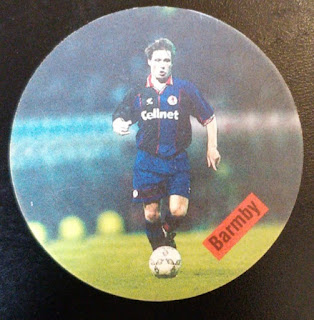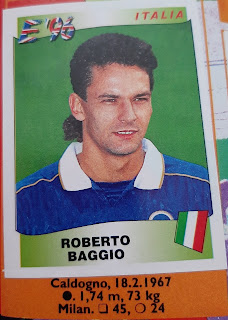52: Nick Barmby, Middlesbrough, Merlin Premier League 96 Magicaps
Today Emlyn Jones brings us the tale of a diminutive midfielder who was deemed worthy enough to adorn a fantastic piece of 90s nostalgia as well as the jerseys of several big clubs and his country. On the topic of 90s nostalgia I feel the need to throw in that today’s subject was my favourite Corinthian figure growing up (physics defying bend of a Subbuteo ball) and it’s a grave injustice he didn’t make it into the Sainsbury’s Euro 96 coin collection. Over to Emlyn.
One of the great applications of Twitter (alongside livestreaming, global trend analysis and vengeful online abuse) is online football trivia. One query that pops up fairly often concerns the nine players to score for six different Premier League sides, inevitably resulting in frustration when obvious names slip the mind. I also found inspiration for this article via one of my oldest friends, Chris. While unpacking his attic to move house, he uncovered an enormous trove of Pogs. Nestled in amongst thirteen Andy Townsends was the fourth man to net for six Premier League sides. Remember Nick Barmby? He's back! In Pog form!
Prior to adorning circular cardboard discs Barmby was born in Hull in 1974. His father, Jeff, had also played professionally and helped guide Nick's career. After attending the FA School of Excellence, he signed for Tottenham Hotspur after finishing school studies. Scoring twice in a testimonial during his first game, manager Terry Venables put Barmby into the first team during the first ever Premier League season. Although only eighteen, Barmby became a regular, and would score 27 goals in 100 games, before newly promoted Middlesbrough made him their most expensive signing to date in 1995, splashing out £5.25m.
Barmby formed a fruitful partnership with Craig Hignett, teeing up the latter for the first goal at the new Riverside Stadium and the duo were affectionately nicknamed 'the Midget gems'. It was during his spell on Teesside that Barmby was first selected for England, and notched his first international goals in a friendly against China in the run up to Euro 96. His former Spurs manager Venables took him to the tournament as midfield cover, and he made three substitute appearances as football didn't quite come home. Not on the pitch for the semi-final, Barmby wasn't able to influence the penalty shootout, meaning he couldn't even get himself a post-tournament pizza advert.
After a solitary season with Boro, Barmby was on the move again for £5.75m, to Merseyside and the blue of Everton. He was able to have an influence from the penalty spot during this spell, missing a chance against Coventry City to go 2-0 up on the final day of the 1997/98 season. At the other end, Dion Dublin was able to snatch an equaliser which gave Everton fans a nail-biting conclusion to the season, eventually staying up on goal difference. After nearly four years and over a hundred games for Everton, interest from the top table came calling and controversy erupted when Manchester United were outbid. Barmby became the first player in 41 years to cross Stanley Park from North to South and transfer from Everton to Liverpool.
There was huge furore at the time, a year prior to Sol Campbell's own 'Judas moment', and rumours abounded that Liverpool manager Gérard Houllier had carried out secret midnight meetings with Barmby ahead of the transfer. This followed an England return, having been frozen out under Glenn Hoddle, and it was rumoured that Liverpool players in the England squad had helped convince him to switch. He endeared himself to his new fans, though undoubtedly not Everton, by scoring his first goal in the Merseyside derby and celebrating effusively. He started well but struggled with injury, and following a second injury hit season in which he managed only six games he was sold on to Leeds United for a cut-price £2.75m. Although at 28 he should have been in his prime, injuries persisted, and after 25 games in two seasons, and a short spell on loan at Nottingham Forest, Barmby moved on a free transfer to his hometown club, Hull City.
With Hull in League One, it seemed this would signal a quiet end to Barmby's career, however, nine goals in his first season helped secure promotion to the Championship, and after three seasons in the second tier Hull were in the playoff final to reach the Premier League. I was at university at the time and remember watching Dean Windass score an absolute thunderbastard to hand the Tigers a 1-0 win and an unlikely return to the top tier for Barmby. He scored a solitary goal back in the top tier to join the six-clubs club, and despite relegation in 2010 stayed with the side for a further two seasons before hanging up his boots in 2012, ahead of being named permanent manager. In a sad end to his association with the club, he was sacked in May that year following media comments about transfer funds. Since then, Barmby has had a short stint as a coach at Scunthorpe United, but otherwise kept a fairly low profile.
The main takeaway from my research is that Barmby seems a thoroughly nice, normal bloke. He has a wife and two kids, one of whom has gone on to a professional football career, and loves a bit of Super League, following hometown Hull FC. He might be one of the frequently forgotten names on the list of multi-club scorers, but truthfully – who cares when you've been immortalised in Pog form?





Comments
Post a Comment